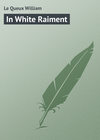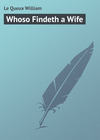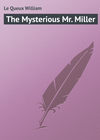Czytaj książkę: «In White Raiment», strona 7
Chapter Thirteen
I Practise a New Profession
“Why, the Colonel – Colonel Chetwode!” the man answered excitedly.
“Colonel Chetwode!” I gasped. “Impossible!”
“It’s a fact,” he declared. “The whole thing’s a deep mystery. They found him at five o’clock this morning.”
“Tell me all about it,” I urged.
“Mr Plummer, sergeant of police, was in here half an hour ago, and he told me all about it. According to what he says, it seems that a workman going across the park to Twickenham early this morning, saw the body of a man on the edge of the lake, half in the water. He rushed forward, and to his horror found it was the Colonel, quite dead.”
“Drowned?”
“No; he wasn’t drowned. That’s the curious part of it. He was murdered.”
“How?”
“By a blow on the head, the police believe. Plummer says that there are lots of marks near the edge of the lake as though a struggle took place.”
“Extraordinary!” I ejaculated. “You say he was quite dead when discovered. Was a doctor called?”
“Yes; the police surgeon, Doctor Douglas. He declared that the poor Colonel had been murdered, and had been dead several hours.”
“Is there no suspicion of the assassin?” I inquired, as the thought of the man whom I had watched in the Park dashed through my brain.
“None whatever,” he answered. “The Colonel was very popular everywhere, and was always good to the poor. It’s his wife who isn’t liked; she’s a rum un’, they say.”
“Where was the body found?” I inquired, when I had seated myself at the table while he had taken up a position before the empty fireplace to continue gossiping.
“Ah!” he said, “you wouldn’t, of course, know the spot, for you’ve never been in the park. There’s a path which leads across the grass at the back of the house through some thickets, and, skirting the lake, crosses the brook by a little bridge. It was just by that bridge that the poor fellow was found. They think that just as he had crossed the bridge he was struck down, and then fell backwards into the lake.”
“Ah! I understand,” I said. “Let’s hope that the detectives will discover something when they arrive. It was evidently a most dastardly bit of work.”
The man’s remark that I had no knowledge of the spot where the body was found aroused me to a sense of my own position. If it were known that I had entered the park that night, might not a serious suspicion fall upon me?
I recollected how, as I had crossed the bridge, I had heard distinctly a short cough. The murderer was, without doubt, lurking there when I had passed.
“Every one is talking of it. Lots of people are going down to see the spot. I shall go down presently. Do you care to come?” the landlord asked.
I acceded willingly, for I wished to see the place in daylight, and, as one of a crowd of sightseers, I should escape observation.
While I ate my breakfast, the man, full of the mystery, continued discussing it in all its phases. I allowed him to run on, for every word he spoke was, to me, of intense interest.
“The poor Colonel was the very last man to have an enemy who would take his life,” he said.
“But his second wife?”
“Ah!” he said with a knowing air, “he was never quite the same after he married again. They say that she flirted indiscriminately with every man she came across, no matter who he was.”
“As bad as that – eh?”
“Of course I don’t know for certain. I only tell you what I’ve ’eard.”
“Of course, of course,” I said. “People will always talk. But do you really think it’s true that she is as giddy as reported?”
“I really don’t know,” he responded, raising his eyebrows. “These women of the upper ten are a queer lot sometimes.”
“Well, the Colonel’s death is a very mysterious affair, at any rate,” I observed.
“Very,” he said. “And one or two evil-tongued people are already suggesting that she might have had a hand in it.”
“That is cruel,” I answered. “She may be unpopular, but that’s no reason why she should be a murderess. I suppose they base their suspicions upon the quarrel of which you told me yesterday.”
“I suppose so. The first Mrs Chetwode was a born lady, but of this woman nobody ever knew anything of who or what she was before he was so misguided as to marry her.”
“Perhaps the police inquiries will throw some light upon that,” I remarked.
“Let’s hope so,” he responded. And then, having finished my breakfast, we went together to the park.
Fortunately, on the previous night, I had been able to slip out and in unobserved, for the landlord had been absent with his wife at a neighbour’s, and was therefore not aware of a fact which might prove damning against me – namely, that I had disguised myself in a suit of secondhand clothes.
The tragedy had been enacted at the bridge I had crossed. I had passed over that very spot, and had actually heard the sound of the assassin’s cough.
Was that a signal to an accomplice? It seemed very much as though there had been two persons lying in wait for the Colonel, and I, having passed at the moment when they expected him, had narrowly escaped being struck down. That cough was possibly the signal that had saved me.
“Pass along, please! Pass along!” said a constable, as I stood staring in wonder at the spot where the body had been found half in the water among the waving reeds.
We receded for some distance, while the publican pointed out the geographical position of the spot with its relation to the house and the high-road.
“It’s a lonely place ’ere of a night,” he said. “Just the place where a man might commit a murder. Funny, however, that the Colonel was wandering about in the park alone!”
“Curious, too, that his presence was not missed by his wife, or any of the household.”
“Yes,” he said. “Very mysterious, indeed. He must have gone out unknown to any one, and, when the place was locked up for the night, it was believed he was indoors.”
“He was wearing evening dress,” I said.
“Oh, I believe so. But I’m not certain. I’ve not heard how he was dressed – I say, Harding,” he cried, turning to a bent old man who chanced to be passing, “how was the Colonel dressed when he was found?”
“In his cut-away coat and shirt,” was the reply. “They said that his shirt-stud was stolen.”
“Ah!” exclaimed my garrulous friend, the publican, “that looks as though it was done with a motive of robbery – don’t it?”
“Yes,” I said, my thoughts reverting again, as they constantly did, to that strange conversation which I had overheard in the darkness, the words of a man who had practically acknowledged himself to be an assassin.
When we again emerged upon the high-road I parted from my companion, he returning to Hounslow and I continuing my walk along the highway leading to Twickenham.
I wandered aimlessly, trying to form some resolution. Had any person seen me enter or leave the park on the previous night? If they had then my position was certainly one of peril, for, if arrested on suspicion, I should experience the utmost difficulty in clearing myself.
Where was Beryl? I called her Beryl, for that was the name by which I had first known her, and it appeared to me that her cousin had falsely introduced her to me as Feo. Had they both returned to London, or were they still at the Park?
At a point beyond Kneller Hall, just then within sight of Twickenham Town, I turned back, and, passing along the boundary of the park to Hounslow railway station, made inquiries of a friendly ticket collector, from whom I learnt that the two ladies had left, with several of the other guests for Waterloo half an hour before.
This information decided me. I went on into the town, and, entering the police-station, sought an interview with the inspector. It fortunately happened that Mr Rowling, the sub-divisional inspector from Brentford, a tall, rosy-faced, smart-looking man, was there, and he being the chief of that sub-district of the T Division, I gave him my card and placed myself at his disposal.
He had ridden over from Brentford in response to a telegram, and looked a veritable giant in his long police riding-boots and spurs. When I told him that I was a medical man who took a great interest in the detection of crime, and therefore wished to assist in the inquiries regarding the Colonel’s death, he looked at me curiously with his merry blue eyes, and again glanced at my card.
“Well, Doctor,” he said, “I’ve sent to Scotland Yard as well as to my superintendent at Hammersmith, and we are expecting three or four men from the Criminal Investigation Department to take up the case. They left by the 09:05 from Waterloo, and will arrive here in a few minutes, I hope.”
“But cannot you give me permission to assist them?”
“That, I fear, is beyond my power. The inquiries are, you see, left entirely to them.”
“But you are chief of this division of police. Surely you can give me permission?”
Before replying he made further inquiries as to who I was and where I lived.
While we were talking three men in plain clothes entered the office and saluted. Then, after briefly explaining the discovery to them, Rowling introduced me as an assistant.
The elder of the three, a thin-faced, dark-haired man, who was an inspector – Bullen by name – while his companions were sergeants, seemed greatly surprised at my application.
“It’s quite irregular, you know,” he said briefly.
“But I think, under the circumstances,” said Rowling, “that the Doctor might be of some service. He has had previous experience in murder cases, and has just applied to me. Of course I referred him to you, as you are to direct the inquiry.”
“The difficulty is that any little indiscretion on his part might upset our plans,” responded the detective.
“I will give you my word of honour to preserve secrecy in everything, and likewise to obey your orders as though I were a subordinate,” I said eagerly.
“Very well,” he replied at last, but not without some reluctance. “Of course, you are not attached to the inquiry officially, but I will give you permission to act with us.”
I thanked him, declaring my intention to use every discretion; and then Rowling gave them a brief description of the character of the man who had discovered the body, and handed them a written report made by the police surgeon, Doctor Douglas, who had been called to examine the body.
“There are no suspicions against any one?” inquired Bullen, after he had read the medical statement aloud to his two companions.
“None,” answered Rowling. “The boundary of the Park is patrolled, but the man on duty last night declares that he saw nobody of whom he could entertain, any suspicion.”
Then, going to the wall, he pointed out on the ordnance map the position of the park and mansion. This having been examined carefully by all three, Rowling gave them a brief description of the murdered man, his wife and his son, very similar to that given by my gossiping friend of the Red Lion.
“There were a lot of visitors at the Park, you say,” Bullen observed. “Are they still there?”
“No. Most of them have returned to London, I believe,” I responded.
“Ah!” said the detective, in a tone of disappointment; “it would have assisted us greatly if we could have seen what kind of persons they were. But we’d better go down to the house and have a look round.”
Chapter Fourteen
A Theory
Half an hour later I stood beside the body of Colonel Chetwode, making a thorough and complete examination.
It was still clothed, just as it had been found, for the local police had given orders that it should not be touched before the arrival of the detectives from headquarters.
The body was that of a tall, thin man, with aquiline, refined features, about sixty or so, with iron-grey hair and moustache, and a brow lined by care and anxiety. His evening clothes, wet and muddy, in the broad light of day gave the corpse a disreputable, neglected appearance, which was rendered even more striking by his dishevelled hair and moustache matted with dried mud.
Bullen was alone with me, his companions being at the spot where the body was found, and as I proceeded to draw up the blind and examine the wound in the dead man’s scalp, the detective stood by in silence watching my examination.
The wound near the base of the skull was, I found to my surprise, quite a superficial one. By its appearance I saw that the police doctor had probed it and quickly found that the injury was not of such a nature as to have caused death.
“Well?” Bullen asked anxiously. “What do you make out of it. Doctor?”
“At present, I can only say that death was not caused by that wound,” I responded.
“Then how, in your opinion, was the crime committed? What, in your opinion, was the weapon used?” he asked.
“At present I am unable to say,” I responded. “The natural conclusion is that it was caused by a blow from a life-preserver, yet a round knob could never have inflicted such a wound. I incline to the opinion that the wound might have been caused by a fall from the bridge upon the rough stones below.”
By the aid of my probe I satisfied myself that the bone was not fractured, as it would have been by a deliberate blow dealt from behind. The nature of the wound, indeed, was very much as if it had been caused by the unfortunate man’s head coming into contact with some sharp stone.
Then, after very careful investigation, lasting over half an hour, during which I took a number of accurate measurements which might be used later in the identification of the weapon, I came to the rather vague conclusion that the crime had been committed not by a blow, but by hurling the victim from the little bridge below which he had been found.
“Do you believe that death was instantaneous?”
“I am not certain,” I responded. “There is no injury to the spinal column which could have caused death. He was, without doubt, pinioned from behind, at the moment he had crossed the foot-bridge, and thrown backward, rolling down the bank into the lake.”
“His shirt-stud has gone,” remarked the detective. “That looks like robbery.”
“I don’t think so,” I answered.
“Why not?”
“Well, do you notice a long green mark there?” I said, pointing to the limp shirt-front. “You see that it runs straight across the stud-hole. By that mark I feel assured there was no robbery.”
“I see the mark,” Bullen answered, “but at the same time, I don’t quite see your argument.”
“That mark was made by a damp branch or bramble. When he fell he tumbled backward into the bushes, and, crashing through them, rolled into the water. One of the branches caught his shirt-stud and broke it out. If you have a strict search made you will find it somewhere near where he fell. His watch and chain and ring are still upon him, you will notice.”
“I quite understand your theory,” he responded. “I will order active search to be made, for it is an important point whether the murder was done by thieves whom he discovered upon his property. It might have been that burglars were lurking there, and, being disturbed by him, they killed him in order to prevent an alarm being raised.”
“I scarcely think that,” I argued. “If they were burglars they would not have attacked him from behind without any ulterior motive. They would have remained in hiding.”
“But how do you account for him wandering about the park at that hour?” asked the detective.
“That point can only be cleared up by his widow,” I exclaimed. “I think we should see Mrs Chetwode without delay.”
With this suggestion he agreed, and having rearranged the body, I left it to the police surgeon to make his post-mortem.
Out in the corridor we met the butler, by whom Bullen sent his card to the widow with the request that she would grant us an interview.
Ten minutes later we were received in the morning-room by a pale, fair-haired, rather fragile woman, the redness of whose eyes told plainly that she had been crying, but whose improvised mourning became her well. She was perhaps thirty, certainly not more, rather handsome, with an air of self-conceit, and a slightly cockney accent in her voice, which told me that she was not quite so well bred as one might have expected the mistress of Whitton to have been.
Bullen apologised for being compelled to intrude upon her privacy, but explained that it was necessary to make searching inquiries into the painful affair, and he would therefore esteem it a favour if she would answer one or two questions.
To this she assented willingly, and, asking us to be seated, sank into an armchair.
The detective had not introduced me, therefore she no doubt believed me to be an emissary of Scotland Yard.
“Have you any idea of the hour at which the Colonel left the house?” asked Bullen.
“No. I think, however, it must have been about half-past ten,” she responded in a hard voice.
I was watching her carefully, and saw by the nervous twitching of her hands that she was striving to calm the conflicting emotions within her. She kept her eyes – beautiful eyes of almost a violet tint – fixed upon her examiner.
“But if he went out as early as that, you would surely wonder why he did not return?” observed the detective.
“Ah, no,” she said quickly. “I was in ignorance of his absence until – until my maid awoke me at a quarter-past five this morning, and told me of the awful discovery.”
She pursed her lips very slightly. That almost imperceptible movement aroused my suspicions. I had been told that she was on bad terms with the dead man, and probably that had prejudiced me against her.
“Then he went out without your knowledge? Will you kindly tell me how you spent the evening?!”
“How I spent the evening?” she asked with a slight start.
“I mean how you all spent the evening,” he said, correcting himself. “You had guests here, I understand.”
“Yes; we had quite a number of people. And after dinner, as usual, the men played billiards and smoked, while we women remained in the drawing-room. About half-past nine the men joined us, a couple of dances were played, some songs were sung, and the evening passed without further event, as far as I am aware.”
“But your husband?”
“Well, about half-past ten he came to me and said that he was not feeling very well, therefore he should go to his room.”
“And you never again saw him alive?”
“No,” she faltered. “When I saw him again he was down in the hall. Some men were carrying him in – dead! Oh, it’s awful! I – I can’t realise it!” And she burst into a torrent of tears.
“It certainly is a most painful affair,” said Bullen, sympathetically; “but we are striving our utmost to solve the mystery. Therefore, I trust you will forgive me for seeking this interview. Whatever information you can give us will assist us very materially in our inquiries.”
“I don’t think I can tell you anything more,” declared the distressed woman.
“But what is your theory? Do you believe that the announcement that he was not feeling well was a mere excuse for absence?”
“Ah, that I cannot tell,” she responded. “The house was locked up at midnight, and it was evident that he was out then, for this morning all the doors were bolted, and the windows were found fastened, just as the servants had left them.”
“Well,” he said, “that shows that he went out before the house was locked up. Were any of the other guests out in the park?”
“Not to my knowledge,” she replied, after a second’s hesitation. “Of course the men went out upon the drive in front of the house, and walked up and down to smoke after dinner.”
“From your statement it would almost appear as though your husband went out to keep some secret appointment. Have you any suspicion that he had arranged to meet any one?”
“None whatever.”
“And he had never mentioned to you any single person with whom he was at enmity?”
“Never.”
“I presume that most of the guests who were here last night have since left?”
“All have left. I am practically alone.”
“I shall be glad if, as soon as you can do so, you will kindly make me out a list of your guests, together with their addresses. We may not require it, but in this matter we must not overlook a single point.”
“But surely you don’t suspect any of them?” she exclaimed quickly.
“We suspect no one, at present,” he responded. “But in order to prosecute our inquiries satisfactorily, it is necessary to know exactly who was in the house at the time of the tragedy.”
“Oh, of course – of course,” she said. “I will make out the list and let you have it in the course of an hour – if that will do?”
“Excellent,” the detective said.
Bullen glanced across to a half-open door, which appeared to give entrance to the library, saying —
“If you will permit us, we will examine the Colonel’s papers; they may give us some clue. It is just possible that he received a letter making the appointment in the park.”
“You are quite at liberty to act just as you think best,” she answered with perfect frankness.
He thanked her, and then tactfully turned the conversation back to the events of the previous night. It might have been owing to the prejudice which I entertained towards her, but somehow she seemed anxious to avoid any remark regarding the period immediately preceding the tragedy. Naturally a wife whose husband has been foully assassinated in a manner so mysterious, would look back in horror upon past events; but in some strange, indefinite way she seemed to hold our presence in dread.
Bullen, not slow to notice this, continued to ply her with questions in order to obtain further details of how the hours after dinner had been spent.
“Who saw your husband last?” he inquired.
“I don’t know for certain. I believe it was one of the guests – a Mr Durrant, with whom he had played billiards.”
“After he had complained to you of not feeling well?”
“No; he played billiards before,” she answered. Then readily added, “On leaving me he returned to the billiard-room to fetch his cigar-case. It was then he wished Mr Durrant good-night.”
“Did he tell him, also, that he was unwell?”
“Yes, I believe so. But Mr Durrant sent a card of sympathy to my room and left without seeing me. I therefore only know this by hearsay from the servants.”
“You have a stepson – Lieutenant Chetwode. Where was he?”
“With me in the drawing-room. Ah! here he comes.” And at that moment a thin, dark-haired, well-set-up young man entered, eyeing us with an inquiring glance.
This, then, was my wife’s lover.
Briefly the widow explained who we were, and, in reply to Bullen’s questions, the dead man’s son described how his father had managed to slip out unobserved, and how his absence had passed unnoticed until the awful discovery had been made in the morning.
“You have no suspicion that he had any enemy, I suppose?” the detective asked.
“None whatever. The terrible affair is a most profound mystery.”
“Yes,” said Bullen reflectively, his grey eyes fixed upon those of the widow; “it’s a mystery we must try to solve.”
“I hope you will,” the young man exclaimed. “My father has fallen beneath the hands of some cowardly assassin concealed in those bushes down by the lake – he was the victim of the revenge of some person unknown.”
“What makes you think the motive was revenge?” inquired the detective, quick to scent any clue.
The widow and her stepson exchanged rapid glances. I was watching, and it occurred to me that some secret understanding existed between them. My friend of the Red Lion had declared that they were enemies, but to me it certainly appeared as though they were acting in complete accord.
“Oh,” responded Cyril Chetwode, rather lamely, “I merely suppose that.”
“Revenge for what?”
“Ah! if we only knew the reason it would not be difficult to find the murderer,” answered the man who loved my wife. “It may be that some person sought revenge for an imaginary grievance.”
“But why was the Colonel walking at that lonely spot at that hour? He must have had an object. It looks suspiciously as though he went to keep a secret appointment. The excuse that he was ill seems to have been made with a view to securing his room from intruders who might disturb him.”
“He may have kept an appointment,” his son replied. “But only he himself could tell us the truth.”
The detective acquiesced, and after some further conversation, in which I joined, he rose, and passing through into the library, commenced an examination of the papers lying on the writing-table. With my rival in the affections of the woman who was my wife, I assisted him, while the widow stood behind us watching, her face pale and anxious and her nervous hands trembling.
She was in fear. Of that I felt absolutely convinced. But what discovery did she dread?
While we were bending, examining the contents of one of the drawers, which was full of papers relating to the Colonel’s duty as a justice of the peace – for it was here that he performed his judicial work – his widow stood behind me, and, with a quick movement, sidled up to her stepson. The next instant it occurred to me that she had passed something to him; but, pretending to be engrossed in the papers, I made no sign that I had observed their rapid exchange.
“Have you found anything?” she inquired calmly, after a few moments.
“No; nothing, unfortunately,” Bullen responded. And then, having searched the room from top to bottom, suggested a move to the Colonel’s bedroom.
Here the search, both of the clothes in his wardrobe and of the room wherein he usually slept, likewise proved fruitless. After twenty minutes or so, however, I contrived, while the others were busy turning over the dead man’s effects, to slip back to the library. Young Chetwode had, at the moment when the suspicious movement had been made behind me, stood with his back to the black marble mantelshelf, and it was to examine this that I returned. While doing so I suddenly found a crack between the wall and the upright marble support, where the plaster had dried out by the heat of the winter fires, and, peering within, I saw something concealed there.
With the aid of my scarf-pin I managed to pick it out, and found that it was an unmounted photograph that had been crumpled in the hand and was dirty. Mrs Chetwode had managed to seize it before we could discover it, and the stepson had concealed it in that ingenious hiding-place.
I spread it out; the picture I gazed upon was both startling and ghastly. It was a portrait of Beryl, my love, supported by pillows, her face expressionless, her eyes closed.
The hideous truth was plain. The photograph had been taken after death!




















